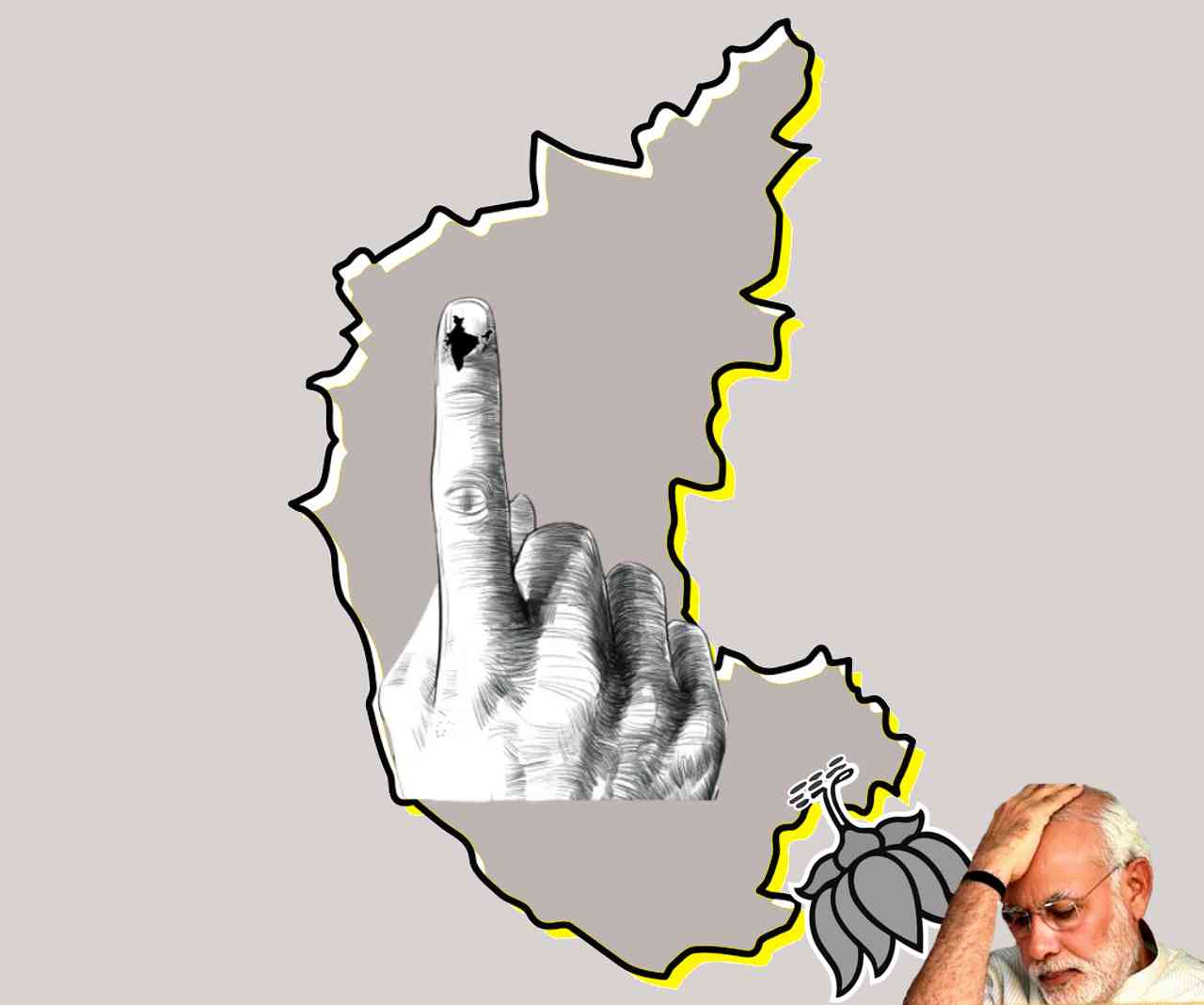Karnataka Verdict 2023: Messages and Lessons

The outcome of the Karnataka Assembly elections has come as a pleasant surprise to even those who were expecting a BJP defeat. The impact of the Karnataka verdict lies in the magnitude of the Congress victory and the BJP’s defeat and the conditions in which this victory was won.
Karnataka was one of the much-trumpeted ‘double engine’ models of the Modi era. For years the state is being nurtured by the Sangh as a model laboratory for the saffron brigade’s sinister experiments, as a southern theatre of the fascist politics of hate and communal polarisation. The BJP’s poll campaign was a veritable blitzkrieg of charged communal salvos with Narendra Modi repeatedly using the Bajrangbali chant to rouse his audience. The TV channels of ‘Godi Media’ wanted us to believe that the Bajrangbali chants and Modi roadshows swept away all signs of anti-incumbency and turned the elections decisively in the BJP’s favour.
Most opinion polls and even the exit polls of course told a different story all through the poll season. Unemployment, price-rise and corruption were the issues uppermost in the public discourse. The Bommai government was clearly being identified in every survey for its corruption and non-performance. For all the BJP’s tall claims of development, the surveys reflected the growing anger of the poor and the toiling people. Large-scale rebellion in the BJP over ticket distribution, defection of some high profile BJP leaders including a former CM and deputy CM to the Congress and Modi’s personal phone call to appease a disgruntled corrupt minister strengthened the perception that the BJP was fighting a losing battle.
The result shows that the BJP has lost seats in all regions of Karnataka except Bengaluru. In spite of the party’s shrill communal campaign its votes and seats fell even in coastal Karnataka, the most sensitive region vulnerable to communal polarisation. The vote share of the BJP may have remained more or less the same as in 2018, hovering around 36 percent, but a closer look reveals a sharp decline in BJP votes which was somewhat offset by the increase in the party’s votes in Bengaluru and Mysuru regions. By contrast, the Congress gains have been more or less uniform across regions and social groups with considerable support from the SC-ST-OBC-minority electorate, women voters and the rural and semi-urban youth.
The BJP’s Karnataka debacle is not to be seen as a mere confirmation of the customary pattern of change of government in the state. In fact, the party claims to have changed this pattern itself in many states where it boasts of riding on so-called ‘pro-incumbency’ waves. Even though Assembly elections have their state-specific contexts, in the Modi era of over-centralisation and personality cult, in the BJP scheme of things every election becomes a vote about the post-2014 Modi era. In Karnataka it became all too pronounced with the state leadership of the BJP being totally side-lined and the Modi-Shah-Nadda trio and hardcore Hindutva icons like Yogi Adityanath or Himanta Biswa Sarma directly taking charge of the entire poll campaign. The Karnataka mandate therefore cannot be divorced from the all-India political context ahead of the big battle of 2024.
What then are the key takeaways of the Karnataka elections as the country gets ready for the crucial next round of Assembly elections and the decisive battle of 2024? The myth of the presumed invincibility of the BJP’s election machine built around the so-called ‘Modi magic’ and Amit Shah’s election management strategy, the folklore of the loyalty of the so-called new class of beneficiaries and the lethal efficacy of the Sangh brigade’s signature strategy of communal polarisation have taken a major beating in Karnataka. To say this is of course not to suggest any automatic replicability of the Karnataka verdict in other states or even in the Lok Sabha elections in the state a year later, but the message of Karnataka will surely resonate across the country.
The Congress clearly ran a focused and energetic campaign in Karnataka. The preparations had begun well in advance; the Bharat Jodo Yatra not only energised the Congress organisation but it also helped shape a broader popular will which did not get derailed or demoralised by the BJP’s high-voltage campaign. Also, much like the ‘no vote to BJP’ campaign in West Bengal two years ago Karnataka too witnessed a spirited campaign by progressive forces and the civil society by platforms like Bahutva Karnataka (a campaign to uphold the cultural diversity of the state) and Eddelu Karnataka (an awareness campaign calling for the defeat of the BJP and its communal fascist offensive) which bolstered the will to vote the BJP out. The people’s campaign even intervened in the opinion poll arena and produced one of the most credible surveys in the election.
The Sangh brigade has been hurt badly by the scale of the defeat and it is bound to intensify its offensive in the coming days. But the Karnataka outcome has also inspired every democracy-loving citizen, every movement for justice and every stream of political opposition alive to the enormity of the growing threat to the Constitution and the very fundamentals of parliamentary democracy. Karnataka has exposed the limits of the Modi cult and the power of the Hindutva discourse. Modi’s victim card and Bajrangbali chant have been squarely defeated in Karnataka, the democratic opposition must not feel intimidated and move confidently towards greater unity and stronger assertion on issues central to people’s welfare and rights and the future of the country as a diverse society and modern democratic republic. Let the BJP’s emphatic defeat in Karnataka mark the beginning of the end of the Sangh-BJP reign of fear, hate and destruction.
Charu Bhawan, U-90, Shakarpur, Delhi 110092
Phone: +91-11-42785864 | +91 9717274961 E-mail: info@cpiml.org

